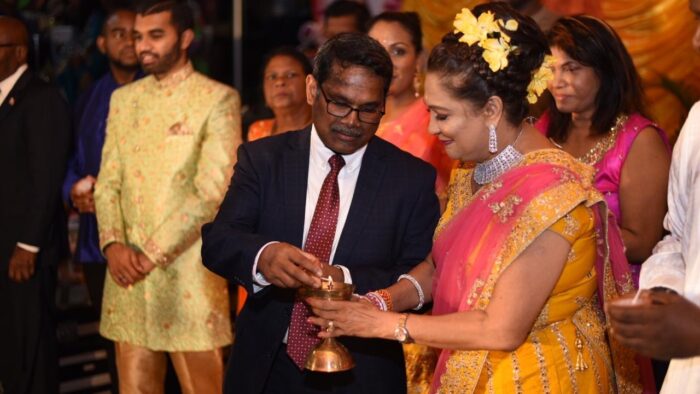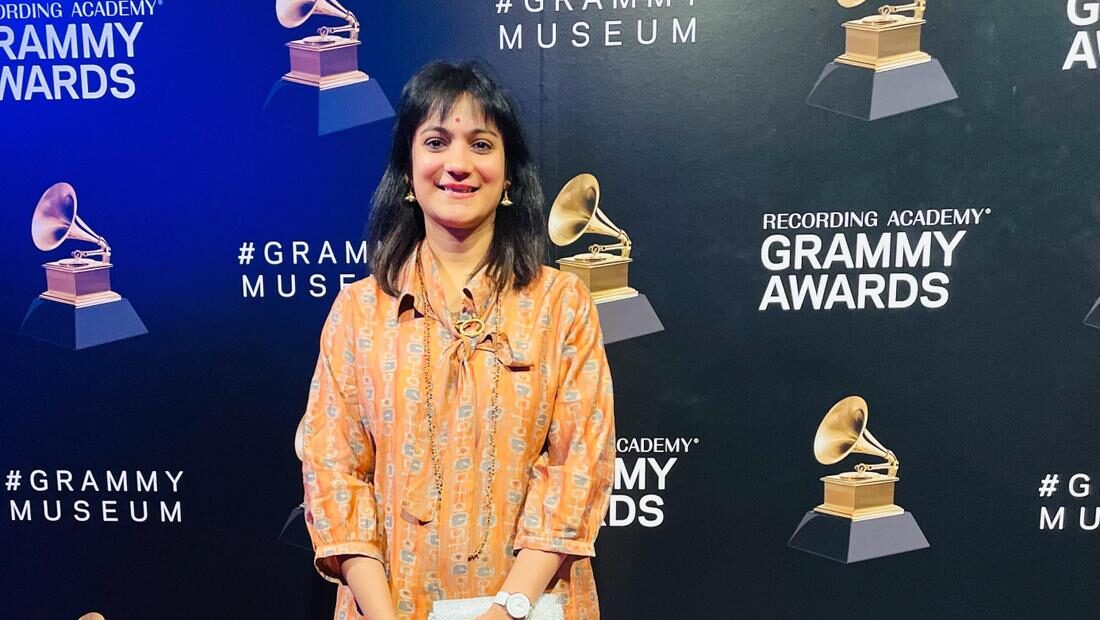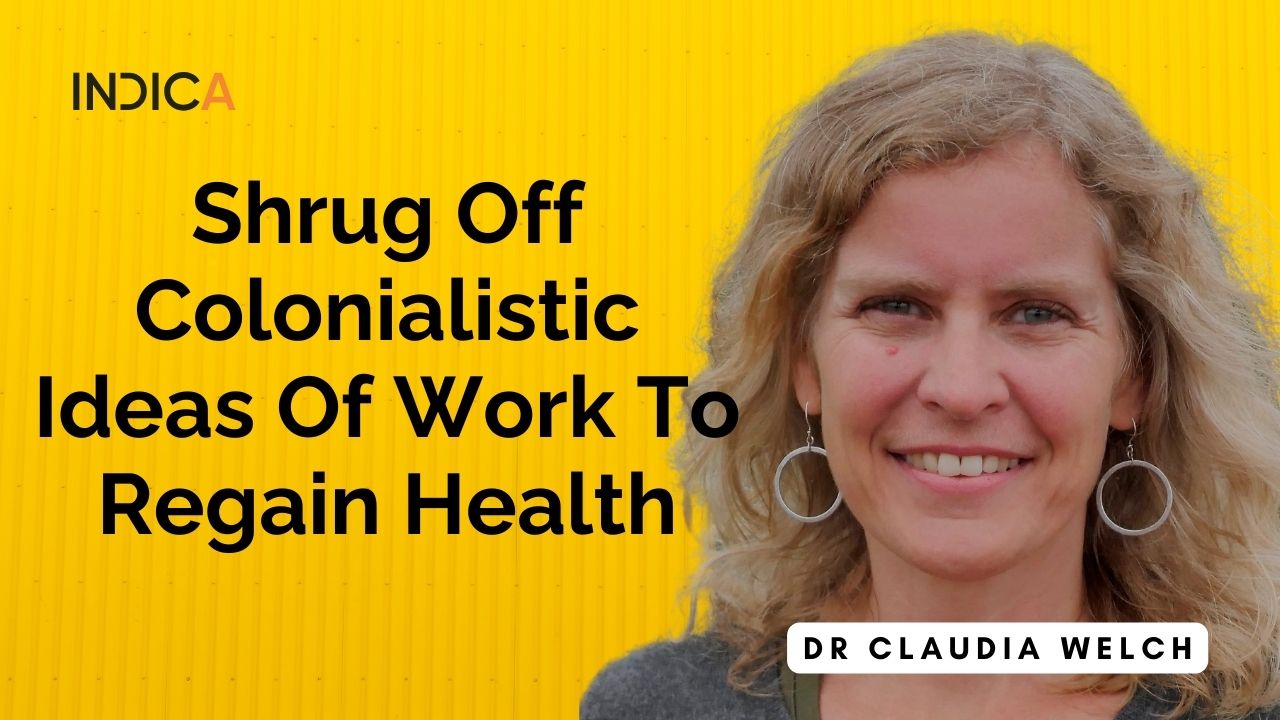Soft-spoken Orissa-born diplomat Arun Kumar Sahu is a poet at heart. His collection of poems “Iguana and Other Poems” was recently published. Sahu is currently posted as the High Commissioner of India to Trinidad and Tobago, Grenada, Dominica and Montserrat. A trained linguist and a JNU alumnus, Sahu joined the Indian Foreign Services (IFS) in 1996.
Avatans Kumar, a US-based columnist and Sahu’s long-time friend from their JNU days speaks to the Ambassador on his poetry and more.

High Commissioner Arun Kumar Sahu calling on the President of Trinidad and Tobago Paula-Mae Weekes
Given the history of the Indian diaspora in the Caribbean, how similar and how independently evolved is it from India in language, culture, faith, etc?
There are some similarities and some differences. One can see the Indianness in their culture, faith and social existence, but many aspects are also Trinidadian. Over the last 175 years, Trinidadians of Indian origin have continued with some socio-cultural practices from India, but many others have also undergone substantial change. Many Indo-Trinis, especially the younger generation do not understand or speak Hindi or Bhojpuri, though most of them love Bollywood films and listen to Hindi songs.
Some Hindu households still use pennants, locally called ‘jhandi’ in their yard (I have written about this in The Hindu, dated 30 August 2020 available at https://www.thehindu.com/opinion/open-page/the-caribbean-pennants/article32472565.ece ), worship many gods and goddesses and listen to Tulsidas’ Sri Ramcharit Manas and other Hindu texts. There are over 300 temples of different sizes all over Trinidad and Tobago. However, they are also intimately connected to life and society in North America and the UK. They speak English and creole, enjoy the soca, doubles, and cricket. Intercultural interaction is a fact of Trinidadian diversity. I have started writing a book about the India connection of Trinidad and Tobago. I am fascinated by the way the indentured laborers and their descendants have carried on their cultural uniqueness.
What is people’s attitude there in terms of Yoga, Ayurveda, Veganism (India’s perceived soft power), etc?
Yoga, Ayurveda, vegetarianism, and astrology are not new to the Trinidadians. Many of them practice them and also promote them. Their rituals of rites of passage are very elaborate. Some of them also believe in Panchang and practice fasting on certain days of a week. At the same time, many of them are also very western in their lifestyle and outlook.
Famous Hindi poet Mahadevi Verma once wrote - ‘viyogi hoga pahala kavi’ (bereaved/detatched will be the first poet). Are you a ‘viyogi’. What inspires you to write poetry?
Detachment is essential for creative output. A writer has to be a mute observer, a silent sufferer to create something that will touch the hearts of many. He is there in the process, but he is also not there. A writer does not write well when he is in a state of suffering or ecstasy. He writes well only when he has gone through the emotion and lived with it for a while.
To me, expressing emotion is not literature. Literature is a craft that expresses the essence of a writer's feelings and links it to the existence of the wider world. It's a mirror with multiple cracks. No image is perfect in this mirror.
I have defined it in my poem "MY POETRY" in the collection IGUANA and Other Poems. I have said,
"My poetry,
It is a mirror of crushed sentiments
A reflection of the living and suffering
The invisible imprint of stillness of moments.
Read it once,
Read it again and again,
Smile, dance and cry with her
Take a deep breath and feel,
Surreptitiously and unwittingly
She will touch your heart.
My poetry."
I am not sure many folks know that you are a trained linguist and I have known you since our JNU days. You were always a graceful and helpful senior. I had a fantastic time working with you at the National Seminar on the 8th Schedule. That being said, has being a trained linguist helped you as poet? How?
Yes, it has. It has helped me to understand the power of language, words, and how to stitch words in a composition. Words, phonemes and morphemes are like pebbles in the seashore. Once you enjoy playing with them, you want to talk to the sea with their help. It has also helped me understand the nuances of a second or third language or a foreign language. Language is both a product and a reflection of history and society. Understanding a language is vital for a writer.
Interesting you talk about multilingualism. What language do you dream in?
Don't know. As you know, an Indian child is born bilingual or trilingual - the mother tongue, which could be a local variety of the standard first language, a dominant second language, in my case English and Hindi because we all watch Bollywood films. Subsequently, one can learn some foreign languages too. I learned Mandarin Chinese. Sometimes, words of two or three languages come in a sentence. I suppose the dreams are all messed up.

Odissi dance in Port of Spain
Talking about dreams is making me drowsy already. Jokes apart, do you really get enough sleep? Being a diplomat, you must keep a busy schedule. When do you find time to write poetry?
I am a loner, mostly detached from many things that I do on a day to day basis. I do my job with the utmost care and dedication, acutely conscious of time. I do not waste my time in fruitless arguments and meaningless socialization. Once I finish my job, I return to my world of solitude and self-introspection.
Specific experiences leave a deep impression on me. I try to live with them for days, months, or maybe even for years. Then one day, they just come out and take a literary form. I wouldn't say I like to write about raw emotions. I allow them to be ripe within me. I have no specific time to write. I write while traveling, in a hotel room, on a flight, after a diplomatic engagement, late at night. There is no specific routine. Sometimes, I do not write for days if I don't feel like it.
What kinds of books do you read? Who are your favorite authors/poets?
I read all kinds, but books dealing with human characters appeal to me the most. I also like books on philosophy and history. I am not a voracious reader but a discerning one. If a book does not appeal to me, I don't proceed with reading it even if its a best seller. I love listening to people.
There is not one favorite author, but many, in various languages such as Odia, Bangla, Hindi, English and of different geography, Russian, African, and Latin American. But two books in my young age attracted me to the world of literature: Paraja of Gopinath Mohanty in Odiya and The Old Man and the Sea of Earnest Hemmingway. In a sense, I didn't read these books, they read me.
What is your idea of relaxation?
Don't do anything—lounge around with a big cup of strong coffee with milk and extra sugar. Don't talk to anybody—no mobile phone. Watch a movie. Listen to Indian classical music, thumri or ghazal, Salman Ali; country music, Frank Sinatra or John Lennon, watch a good movie or a stand-up comedy.
You also write short stories. Between poetry and prose, which one is your favorite, and why?
There is no favorite. I write all kinds of literature. For me, the art of writing is only a tool to express what I want to convey. The inherent urge to express a feeling, theme, or character decides the form of literature, whether a poem, a short story or a prose piece. What I have observed in me is that a feeling usually takes resort in a poem, a character in a short story, and a narrative in prose. The satisfaction is actually in playing with the words, phrases, and finally able to say what I wanted to say. I am comfortable in creating literature in all forms. Someday in future, I intend to write a novel too.
I will certainly look forward to that. Has poetry affected the way you approach diplomacy?
It's a complementary relationship. Not only poetry but literature, in general, is the dissection of the society, the good, the bad, and the ugly. If a diplomat understands literature, he or she understands the mind of a community he lives in, which in return sharpens his insight in providing critical inputs for policymaking and statecraft. Diplomacy as a profession, on the other hand, exposes one to an unbelievable range of diversity and people.
(Cover picture: Sahu with former Prime Minister Kamla Persad Bissesar (of Indian origin). “Iguana and Other Poems” can be purchased at https://www.amazon.com/dp/B08HGLNN39/)




